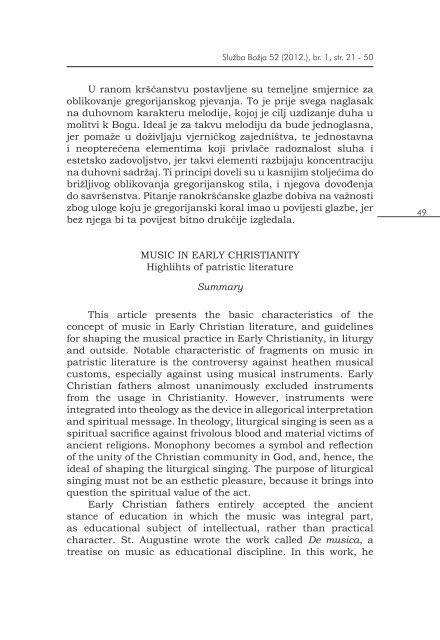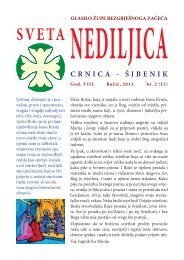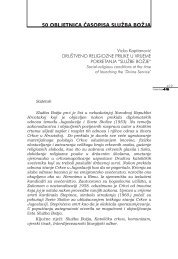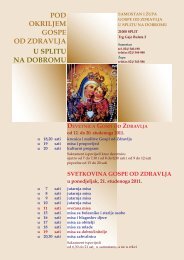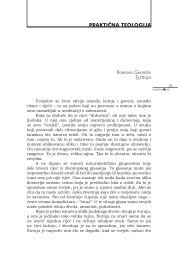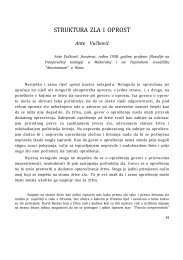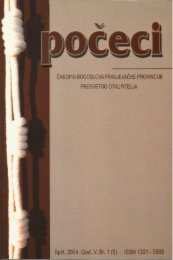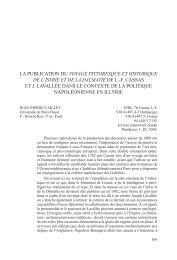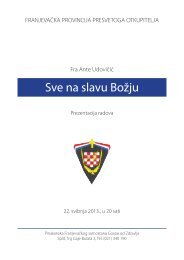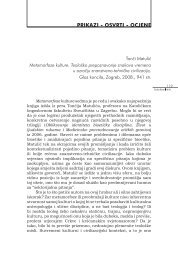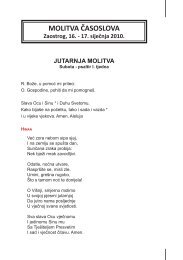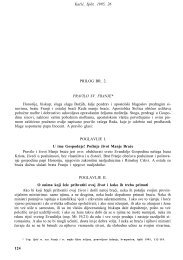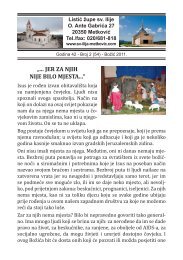pdf (297 KB), Hrvatski, Str. 21 - Srce
pdf (297 KB), Hrvatski, Str. 21 - Srce
pdf (297 KB), Hrvatski, Str. 21 - Srce
You also want an ePaper? Increase the reach of your titles
YUMPU automatically turns print PDFs into web optimized ePapers that Google loves.
Služba Božja 52 (2012.), br. 1, str. <strong>21</strong> - 50<br />
U ranom kršćanstvu postavljene su temeljne smjernice za<br />
oblikovanje gregorijanskog pjevanja. To je prije svega naglasak<br />
na duhovnom karakteru melodije, kojoj je cilj uzdizanje duha u<br />
molitvi k Bogu. Ideal je za takvu melodiju da bude jednoglasna,<br />
jer pomaže u doživljaju vjerničkog zajedništva, te jednostavna<br />
i neopterećena elementima koji privlače radoznalost sluha i<br />
estetsko zadovoljstvo, jer takvi elementi razbijaju koncentraciju<br />
na duhovni sadržaj. Ti principi doveli su u kasnijim stoljećima do<br />
brižljivog oblikovanja gregorijanskog stila, i njegova dovođenja<br />
do savršenstva. Pitanje ranokršćanske glazbe dobiva na važnosti<br />
zbog uloge koju je gregorijanski koral imao u povijesti glazbe, jer<br />
bez njega bi ta povijest bitno drukčije izgledala.<br />
MUSIC IN EARLY CHRISTIANITY<br />
Highlihts of patristic literature<br />
Summary<br />
This article presents the basic characteristics of the<br />
concept of music in Early Christian literature, and guidelines<br />
for shaping the musical practice in Early Christianity, in liturgy<br />
and outside. Notable characteristic of fragments on music in<br />
patristic literature is the controversy against heathen musical<br />
customs, especially against using musical instruments. Early<br />
Christian fathers almost unanimously excluded instruments<br />
from the usage in Christianity. However, instruments were<br />
integrated into theology as the device in allegorical interpretation<br />
and spiritual message. In theology, liturgical singing is seen as a<br />
spiritual sacrifice against frivolous blood and material victims of<br />
ancient religions. Monophony becomes a symbol and reflection<br />
of the unity of the Christian community in God, and, hence, the<br />
ideal of shaping the liturgical singing. The purpose of liturgical<br />
singing must not be an esthetic pleasure, because it brings into<br />
question the spiritual value of the act.<br />
Early Christian fathers entirely accepted the ancient<br />
stance of education in which the music was integral part,<br />
as educational subject of intellectual, rather than practical<br />
character. St. Augustine wrote the work called De musica, a<br />
treatise on music as educational discipline. In this work, he<br />
49


